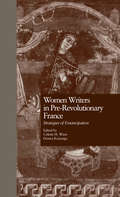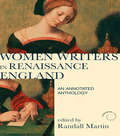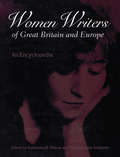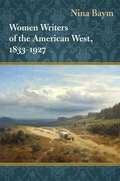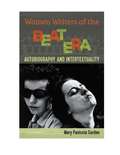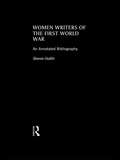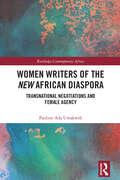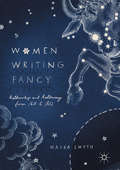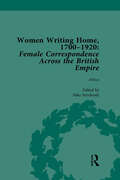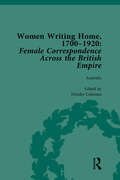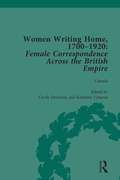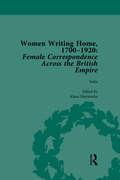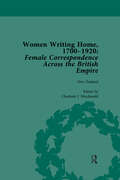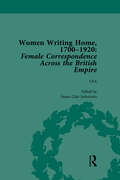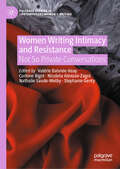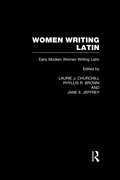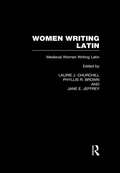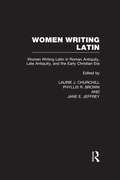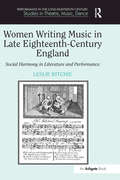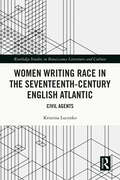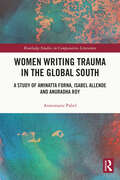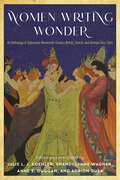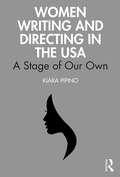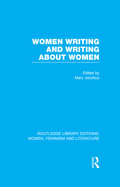- Table View
- List View
Women Writers in Pre-Revolutionary France: Strategies of Emancipation (Women Writers Of The World Ser. #No. 2)
by Colette H. Winn Donna KuizengaThis extensive collection of English-language essays examines the many strategies of resistance to male domination that women in France from the 16th through the 18th centuries utilized in their lives and their writings.
Women Writers in Renaissance England: An Annotated Anthology (Longman Annotated Texts)
by Randall MartinOf all the new developments in literary theory, feminism has proved to be the most widely influential, leading to an expansion of the traditional English canon in all periods of study. This book aims to make the work of Renaissance women writers in English better known to general and academic readers so as to strengthen the case for their future inclusion in the Renaissance literary canon. This lively book surveys women writers in the sixteenth century and early seventeenth centuries. Its selection is vast, historically representative, and original, taking examples from twenty different, relatively unknown authors in all genres of writing, including poetry, fiction, religious works, letters and journals, translation, and books on childcare. It establishes new contexts for the debate about women as writers within the period and suggests potential intertextual connections with works by well-known male authors of the same time. Individual authors and works are given concise introductions, with both modern and historical critical analysis, setting them in a theoretical and historicised context. All texts are made readily accessible through modern spelling and punctuation, on-the-page annotation and headnotes. The substantial, up-to-date bibliography provides a source for further study and research.
Women Writers of Great Britain and Europe: An Encyclopedia (Reference Library Of The Humanities)
by June Schlueter Katharina M. Wilson Paul SchlueterA valuable survey and reference resource It is hard to imagine a more needed and more useful literary reference work than this one, which gives students and readers quick access to the lives and work of a wide range of notable female writers from England and the Continent, from Aphra Behn to Emily Bronte, from Simone de Beauvoir to Isak Dinesen, from Bridget of Sweden to Hannah Arendt. Writers in more than 30 languages are included: French, Czech, Greek, Italian, Swedish, Spanish, German, Russian, Portuguese, Serbian, Catalan, Arabic, Hebrew, Dutch, Bulgarian, Croatian, Slovak, and more. Covers 1,500 years and all major genres Going back 15 centuries, the Encyclopedia covers the authors of novels, short stories, poetry, plays, criticism, social commentary, feminist manifestos, romances, mysteries, memoirs, children's literature, biography, and other genres. In signed entries, some of which are mini-essays, experts in the field examine writers' lives and achievements, comment on individual works, place artistic efforts in historical context, provide insights and analyses, and present more information than can be easily found elsewhere without undertaking more exhaustive research. Each entry is followed by a bibliography of primary works. Indexed by language, nationality, genre, and century. Spotlights the interesting lives of notable writers In these pages students and readers will meet hundreds of interesting women writers who made lasting contributions to the intellectual and popular culture of their countries while often leading fascinating lives, among them: * AGATHA CHRISTIE , who wrote her first book in response to her sister's demand for a detective story that was harder to solve than the popular fiction of her day, and whose work has been translated in more languages than Shakespeare's. * HILDEGARD VON BINGEN , the 12th-century German mystic, who wrote profusely as a prophet, a poet, a dramatist, a physician, and a political moralist, often communicated with popes and princes, and exerted a tremendous influence on the Western Europe of her time * MARY WOLLSTONECRAFT SHELLEY, whose 1818 masterpiece Frankenstein; or, The Modern Prometheus became a literary sensation around the world * ILSE BLUMENTHAL-WEISS, one of the few concentration camp survivors to memorialize the victims of the Holocaust in German verse * LINA WERTMULLER, who in addition to her work in films, has written plays for the stage and a novel, and who once was a member of a short-lived puppet theater that staged the works of Kafka. Special features: Ideal for quick reference and student research * Multicultural-covers over 30 languages and 15 centuries * Includes many contemporary writers * Provides essential biographic data on each writer * Each entry is followed by a chronological listing of the writer's published book-length works * Offers critical evaluations of major works * Indexes help find writers by country...research by time period...survey genres...focus on languages
Women Writers of the American West, 1833-1927
by Nina BaymWomen Writers of the American West, 1833-1927 recovers the names and works of hundreds of women who wrote about the American West during the nineteenth and early twentieth centuries, some of them long forgotten and others better known novelists, poets, memoirists, and historians such as Willa Cather and Mary Austin Holley. Nina Baym mined literary and cultural histories, anthologies, scholarly essays, catalogs, advertisements, and online resources to debunk critical assumptions that women did not publish about the West as much as they did about other regions. Elucidating a substantial body of nearly 650 books of all kinds by more than 300 writers, Baym reveals how the authors showed women making lives for themselves in the West, how they represented the diverse region, and how they represented themselves. Baym accounts for a wide range of genres and geographies, affirming that the literature of the West was always more than cowboy tales and dime novels. Nor did the West consist of a single landscape, as women living in the expanses of Texas saw a different world from that seen by women in gold rush California. Although many women writers of the American West accepted domestic agendas crucial to the development of families, farms, and businesses, they also found ways to be forceful agents of change, whether by taking on political positions, deriding male arrogance, or, as their voluminous published works show, speaking out when they were expected to be silent.
Women Writers of the Beat Era: Autobiography and Intertextuality (Cultural Frames, Framing Culture)
by Mary Paniccia CardenThe Beat Generation was a group of writers who rejected cultural standards, experimented with drugs, and celebrated sexual liberation. Starting in the 1950s with works such as Jack Kerouac’s On the Road, Allen Ginsberg’s Howl, and William S. Burroughs’s Naked Lunch, the Beat Generation defined an experimental zeitgeist that endures to today. Yet left out of this picture are the Beat women, who produced a large body of writing from the 1950s through the 1970s and beyond. In Women Writers of the Beat Era, Mary Paniccia Carden gives voice to these female writers and demonstrates how their work redefines our understanding of "Beat." The first single-authored study on female writers of this generation, the book offers vital analysis of autobiographical works by Diane di Prima, ruth weiss, Hettie Jones, Joanne Kyger, and others, introducing the reader to new voices that interact with and reconfigure the better-known narratives of the male Beat writers. In doing so, Carden demonstrates the significant role women played in this influential and dynamic literary movement.
Women Writers of the First World War: An Annotated Bibliography
by Sharon Ouditt'They also serve who only stand and wait' The idea of there being a 'women's writing' during the First World War is often dismissed. The war, the story goes, was a masculine domain, and as women did not fight, it is also assumed that they were excluded from a war experience. This bibliography challenges that view by listing and annotating hundreds of published books, articles, memoirs, diaries and letters written by women during the First World War. Included are: * Virginia Woolf * Katherine Mansfield * G.B Stern * Brenda Girvin * known and unknown autobiographers and diarists * writers of pro and anti-war propaganda * journal and magazine articles * literary, cultural and historical criticism
Women Writers of the New African Diaspora: Transnational Negotiations and Female Agency (Routledge Contemporary Africa)
by Pauline Ada UwakwehThis book makes a significant addition to the field of literary criticism on African Diaspora literatures. In one volume, it brings together the novels of eight transnational African Diaspora women writers, Yaa Gyasi, Chika Unigwe, Chimamanda Adichie, Imbole Mbue, NoViolet Bulawayo, Aminatta Forna, Taiye Selasi, and Leila Aboulela, and positions them as chroniclers of African immigrant experiences. The book inspires critical readings of these writers’ works by revealing emerging trends in women’s literature as they are being determined and redefined by immigration. As transnational subjects, the writers engage various meanings of mobility and exhibit innovative aesthetic styles; they create awareness on gender identities and transformations, constructions of home and belonging, as well as the politics of citizenship in the hostland. The book also highlights the importance of reverse migrations and performance returns to the homeland as an expression of human desire for home and belonging, and taken as a whole, it enhances our understanding of how migration and transnational existence are (re)shaping immigrant subjects. This book will be of interest to scholars, students, and researchers of African Diaspora literatures and gender studies, who will find this book beneficial for investigating critical trends, approaches to transnational literature, and for comprehending the diasporic burdens that transnational immigrants bear.
Women Writing Fancy
by Maura SmythThis book brings to the foreground the largely forgotten "Fancy" of the seventeenth and eighteenth centuries and follows its traces as they extend into the nineteenth and twentieth. Trivialized for its flightiness and femininity, Fancy nonetheless provided seventeenth- and eighteenth-century women writers such as Margaret Cavendish, Aphra Behn, Delarivier Manley, Eliza Haywood, and Anna Barbauld a mode of vision that could detect flaws in the Enlightenment's patriarchal systems and glimpse new, female-authored worlds and genres. In carving out unreal, fanciful spaces within the larger frame of patriarchal culture, these women writers planted Fancy--and, with it, female authorial invention--at the cornerstone of Enlightenment empirical endeavor. By finally taking Fancy seriously, this book offers an alternate genealogy of female authorship and a new framework for understanding modernity's triumph.
Women Writing Home, 1700-1920 Vol 1: Female Correspondence Across the British Empire
by Deirdre Coleman Cecily Devereux Klaus Stierstorfer Susan Clair Imbarrato Charlotte J MacdonaldAssembles a range of women's letters from the former British Empire. These letters 'written home' are not only historical sources; they are also representations of the state of the Empire in far-off lands sent home to Britain and, occasionally, other centres established as 'home'.
Women Writing Home, 1700-1920 Vol 2: Female Correspondence Across the British Empire
by Deirdre Coleman Cecily Devereux Klaus Stierstorfer Susan Clair Imbarrato Charlotte J MacdonaldAssembles a range of women's letters from the former British Empire. These letters 'written home' are not only historical sources; they are also representations of the state of the Empire in far-off lands sent home to Britain and, occasionally, other centres established as 'home'.
Women Writing Home, 1700-1920 Vol 3: Female Correspondence Across the British Empire
by Deirdre Coleman Cecily Devereux Klaus Stierstorfer Susan Clair Imbarrato Charlotte J MacdonaldAssembles a range of women's letters from the former British Empire. These letters 'written home' are not only historical sources; they are also representations of the state of the Empire in far-off lands sent home to Britain and, occasionally, other centres established as 'home'.
Women Writing Home, 1700-1920 Vol 4: Female Correspondence Across the British Empire
by Deirdre Coleman Cecily Devereux Klaus Stierstorfer Susan Clair Imbarrato Charlotte J MacdonaldAssembles a range of women's letters from the former British Empire. These letters 'written home' are not only historical sources; they are also representations of the state of the Empire in far-off lands sent home to Britain and, occasionally, other centres established as 'home'.
Women Writing Home, 1700-1920 Vol 5: Female Correspondence Across the British Empire
by Deirdre Coleman Cecily Devereux Klaus Stierstorfer Susan Clair Imbarrato Charlotte J MacdonaldAssembles a range of women's letters from the former British Empire. These letters 'written home' are not only historical sources; they are also representations of the state of the Empire in far-off lands sent home to Britain and, occasionally, other centres established as 'home'.
Women Writing Home, 1700-1920 Vol 6: Female Correspondence Across the British Empire
by Deirdre Coleman Cecily Devereux Klaus Stierstorfer Susan Clair Imbarrato Charlotte J MacdonaldAssembles a range of women's letters from the former British Empire. These letters 'written home' are not only historical sources; they are also representations of the state of the Empire in far-off lands sent home to Britain and, occasionally, other centres established as 'home'.
Women Writing Intimacy and Resistance: Not So Private Conversations (Palgrave Studies in Contemporary Women’s Writing)
by Valérie Baisnée-Keay Corinne Bigot Nicoleta Alexoae-Zagni Stephanie Genty Nathalie Saudo-WelbyThis collection explores how women writers in the English-speaking world transform personal intimacy into political engagement, challenging cultural oppression across genres—life writing, novels, poetry, and theatre—from the 19th century to today. Guided by the feminist slogan &“the personal is political,&” it bridges feminist, decolonial, ethnic, and queer studies, revealing how gender-based domination intersects with other forms of oppression. The authors highlight how these writers, across various forms of expression, imagine new modes of resistance and carve out space for social change.
Women Writing Latin: Early Modern Women Writing Latin (Women Writers of the World #3)
by Laurie J. Churchill Phyllis R. Brown Jane E. JeffreyThis book is part of a 3-volume anthology of women's writing in Latin from antiquity to the early modern era. Each volume provides texts, contexts, and translations of a wide variety of works produced by women, including dramatic, poetic, and devotional writing. Volume Three covers women's writing in Latin during the early modern period (1400-1700).
Women Writing Latin: Medieval Modern Women Writing Latin (Women Writers of the World #Vol. 2)
by Laurie J. Churchill Phyllis R. Brown Jane E. JeffreyThis book is part of a 3-volume anthology of women's writing in Latin from antiquity to the early modern era. Each volume provides texts, contexts, and translations of a wide variety of works produced by women, including dramatic, poetic, and devotional writing. Volume Two covers women's writing in Latin in the Middle Ages.
Women Writing Latin: Women Writing Latin in Roman Antiquity, Late Antiquity, and the Early Christian Era (Women Writers of the World #1)
by Laurie J. Churchill Phyllis R. Brown Jane E. JeffreyThis book is part of a 3-volume anthology of women's writing in Latin from antiquity to the early modern era. Each volume provides texts, contexts, and translations of a wide variety of works produced by women, including dramatic, poetic, and devotional writing. Volume One covers the age of Roman Antiquity and early Christianity.
Women Writing Music in Late Eighteenth-Century England: Social Harmony in Literature and Performance (Performance In The Long Eighteenth Century: Studies In Theatre, Music, Dance Ser.)
by Leslie RitchieCombining new musicology trends, formal musical analysis, and literary feminist recovery work, Leslie Ritchie examines rare poetic, didactic, fictional, and musical texts written by women in late eighteenth-century Britain. She finds instances of and resistance to contemporary perceptions of music as a form of social control in works by Maria Barth mon, Harriett Abrams, Mary Worgan, Susanna Rowson, Hannah Cowley, and Amelia Opie, among others. Relating women's musical compositions and writings about music to theories of music's function in the formation of female subjectivities during the latter half of the eighteenth century, Ritchie draws on the work of cultural theorists and cultural historians, as well as feminist scholars who have explored the connection between femininity and performance. Whether crafting works consonant with societal ideals of charitable, natural, and national order, or re-imagining their participation in these musical aids to social harmony, women contributed significantly to the formation of British cultural identity. Ritchie's interdisciplinary book will interest scholars working in a range of fields, including gender studies, musicology, eighteenth-century British literature, and cultural studies.
Women Writing Race in the Seventeenth-Century English Atlantic: Civil Agents (Routledge Studies in Renaissance Literature and Culture)
by Kristina LucenkoWomen Writing Race in the Seventeenth-Century English Atlantic: Civil Agents highlights early modern women writers’ invocations of civility to reach for the privileges of whiteness. The women studied in this book were writing in various textual modes and span boundaries of ideology, class, religion and race: Royalist writer Margaret Cavendish; notorious “German princess” Mary Carleton; early Quaker missionaries to Barbados Lydia Fell, Alice Curwen, and Elizabeth Hooton; and Patience Boston, a Native woman from Monomoy on Cape Cod. As this book explores, women writing in the early English Atlantic engaged civility as a concept and an idiom whose racialist implications were becoming codified. Some of the women analyzed embraced and leveraged the practice of civility as a form of agency, while others resisted and were marginalized by it.
Women Writing Trauma in the Global South: A Study of Aminatta Forna, Isabel Allende and Anuradha Roy (Routledge Studies in Comparative Literature)
by Annemarie PabelThrough exploring complex suffering in the writings of Aminatta Forna, Isabel Allende and Anuradha Roy, Women Writing Trauma in the Global South dismantles conceptual shortcomings and problematic imbalances at the core of existing theorizations around psychological trauma. The global constellation of women writers from Sierra Leone, Chile and India facilitates a productive analysis of how the texts navigate intertwined experiences of individual and systemic trauma. The discussion departs from a recent critical turn in literary and cultural trauma studies and transgresses many interrelated boundaries of geocultural contexts, language and genre. Discovering the role of literary forms in reparative articulation and empathic witnessing, this critical intervention develops new ideas for an inclusive conceptual expansion of trauma from the global peripheries and contributes to the ongoing debate on marginalized suffering.
Women Writing Wonder: An Anthology of Subversive Nineteenth-Century British, French, and German Fairy Tales (The Donald Haase Series in Fairy-Tale Studies)
by Anne E. Duggan Julie L. J. Koehler Shandi Lynne Wagner Adrion DulaWomen Writing Wonder: An Anthology of Subversive Nineteenth-Century British, French, and German Fairy Tales is a translation and critical edition that fills a current gap in fairy-tale scholarship by making accessible texts written by nineteenth-century British, French, and German women authors who used the genre of the fairy tale to address issues such as class, race, and female agency. These shared themes crossed national borders are due to both communication among these writers and changes in nineteenth-century European societies that similarly affected women in Western Europe. In effect, the combined texts reveal a common, transnational tradition of fairy tales by women writers who grapple with gender, sexual, social, and racial issues in a post–French Revolution Europe. The anthology provides insight into the ways the fairy tale served as a vehicle for women writers—often marginalized and excluded from more official or public genres—to engage in very serious debates. Women Writing Wonder, divided into three parts by country, features tales that depict relationships that cross class and racial divides, thus challenging normative marriage practices; critically examine traditional fairy-tale tropes, such as "happily ever after" and the need for a woman to marry; challenge the perception that fairy-tale collecting, editing, and creation was male work, associated particularly with the Grimms; and demonstrate the role of women in the development of the emerging field of children’s literature and moral tales. Through their tales, these women question, among other issues, the genre of the fairy tale itself, playing with the conventional fairy-tale narrative to compose their proto-feminist tales. By bringing these tales together, editors and translators Julie L. J. Koehler, Shandi Lynne Wagner, Anne E. Duggan, and Adrion Dula hope both to foreground women writers’ important contributions to the genre and to challenge common assumptions about what a fairy tale is for scholars, students, and general readers.
Women Writing and Directing in the USA: A Stage of Our Own
by Kiara PipinoWomen Writing and Directing in the USA: A Stage of Our Own features interviews with some of the most successful theatre artists currently working on and off Broadway and beyond. The book provides an insight on what it means and what it takes to be a successful female-identifying playwright and director in the USA, where the professional theatrical landscape is still mostly dominated by straight white men. The interviews explore a wide range of themes, including if and how the artists’ female perspective influenced their art, the social and cultural significance of their work, and how theatre and women working in theatre can participate in awakening greater social awareness. Readers will learn about some of the most current and relevant American theatre artists, such as Young Jean Lee, Pam MacKinnon, Dominique Morisseau, Rachel Chavkin, and Martyna Majok. Written for students in directing and playwriting courses, Women Writing and Directing in the USA: A Stage of Our Own features inspirational and informative stories that will help young theatre artists find and pursue their artistic voices.
Women Writing and Writing about Women (Routledge Library Editions: Women, Feminism and Literature #Vol. 3)
by Mary JacobusThis innovative collection of contemporary essays in feminist literary criticism provides a spectrum of approaches and positions, united by their common focus on writing by and about women. Spanning the novel, poetry, drama, film and criticism, the contributors emphasise some of the problems of theory and practice posed by writing as a woman and by women’s representation in literature. The subjects of individual essays range from the nineteenth and twentieth century novel to avant-garde film, and from Victorian women poets to Russian women poets of today. Drawing on disciplines as diverse as structuralism, psychoanalysis, semiotics, socio-linguistics and Marxist analyses of literature, the essays suggest the variety and vigour of contemporary feminist literary criticism, as well as representing some of the debates currently animating it. Topics of common concern range from the nature of a women’s tradition in literature to the scope and method of feminist literary criticism itself. Successfully bridging the gap between literary criticism and literary production, the scope of this collection will be of considerable interest to those concerned with current developments in literary criticism as well as to those in the field of women’s studies.
Women Writing the English Republic, 1625–1681
by Katharine GillespieScholars have fiercely debated the causes of the English Civil Wars and the rise of anti-monarchical and republican thought a century before the American Revolution. This ambitious and highly original book is the first to argue that women played a significant role in formulating and enacting English republican precepts. Even as feminists contend that republicanism's division of the private from the public sphere excluded women from political power, Gillespie demonstrates how seventeenth-century Englishwomen articulated republicanism's key insight: meaningful action, political or otherwise, does and should take place outside the purview of government, in spheres that not only include women, but that women helped construct. Drawing on the works of six women writers of the period, the book examines their writings and explores the key themes and concepts that they build upon.
